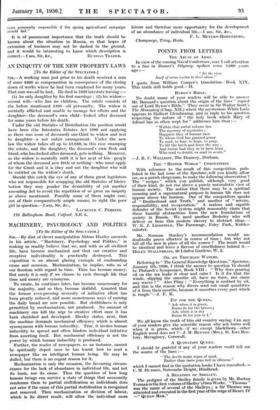MACHINERY, PSYCHOLOGY AND POLITICS
[To the Editor of the SPECTATOR.]
SIR,—By dint of clever manipulation Aldous Huxley succeeds in his article, " Machinery, Psychology and Politics," in making us readily believe that we, and with us all civilized life, have become mechanized and that our creative and receptive individuality is practically destroyed. This exposition is an almost glaring example of confounding cause and occasion. Mechanization, he implies, robs us of our freedom with regard to time. Time has become money. But surely it is only if we choose to rush through life that time and money are synonyms.
To create, he continues later, has become unnecessary for the majority, and so they become slothful. Granted that the former ever-pressing necessity of initiative effort has been greatly reduced, and more monotonous ways of earning the daily bread are now possible. But slothfulness is only permitted by mechanization, not produced. No amount of machinery can kill the urge to creative effort once it has been cherished and developed. Huxley states, next, that the machine demands mechanical efficiency which is almost synonymous with human imbecility. True, it invites human imbecility to spread and often hinders individual initiative from asserting itself. But mechanical efficiency is not the power by which human imbecility is produced.
Further, the reader of newspapers, as an instance, cannot be spiritually doped once lie has learnt how to read a newspaper like an intelligent human being. He may be dulled, but there is no cogent reason for it.
Mechanization is only the occasion, the favouring circum- stance for the lack of abundance in individual life, and not its basis, nor its cause. Thus the question of how long human beings can survive a state of things that necessarily condenms them to partial stultification as individuals does not arise if the cause of this partial stultification is recognized and removed. Then mechanization or division of labour, which- is its direct result, will allow the individual more leisure and therefore more opportunity for the development of an abundance of individual life.—I am, Sir, &c.,
Champneys, Tring, Herts. F. L. MEYERN-HOIIENBERO.






































 Previous page
Previous page